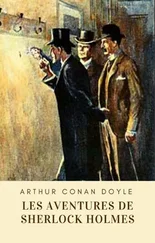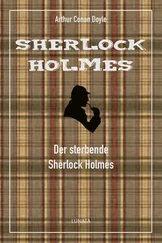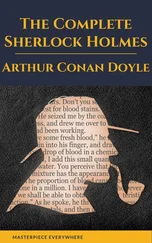“Good-night, gentlemen both,” said Jonathan Small.
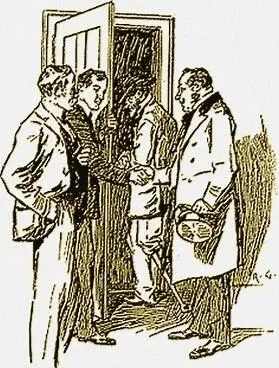
“You first, Small,” remarked the wary Jones as they left the room. “I’ll take particular care that you don’t club me with your wooden leg, whatever you may have done to the gentleman at the Andaman Isles.”
“Well, and there is the end of our little drama,” I remarked, after we had set some time smoking in silence. “I fear that it may be the last investigation in which I shall have the chance of studying your methods. Miss Morstan has done me the honour to accept me as a husband in prospective.”
He gave a most dismal groan. “I feared as much,” said he. “I really cannot congratulate you.”
I was a little hurt. “Have you any reason to be dissatisfied with my choice?” I asked.
“Not at all. I think she is one of the most charming young ladies I ever met, and might have been most useful in such work as we have been doing. She had a decided genius that way: witness the way in which she preserved that Agra plan from all the other papers of her father. But love is an emotional thing, and whatever is emotional is opposed to that true cold reason which I place above all things. I should never marry myself, lest I bias my judgement.”
“I trust,” said I, laughing, “that my judgement may survive the ordeal. But you look weary.”
“Yes, the reaction is already upon me. I shall be as limp as a rag for a week.”
“Strange,” said I, “how terms of what in another man I should call laziness alternate with your fits of splendid energy and vigour.”
“Yes,” he answered, “there are in me the makings of a very fine loafer and also of a pretty spry sort of fellow. I often think of those lines of old Goethe:—
Schade, dass die Natur nur einen Mensch aus Dir schuf,
Denn zum würdigen Mann war und zum Schelmen der Stoff.
By the way, à propos of this Norwood business, you see that they had, as I surmised, a confederate in the house, who could be none other than Lal Rao, the butler: so Jones actually has the undivided honour of having caught one fish in his great haul.”
“The division seems rather unfair,” I remarked. “You have done all the work in this business. I get a wife out of it, Jones gets the credit, pray what remains for you?”
“For me,” said Sherlock Holmes, “there still remains the cocaine bottle.” And he stretched his long white hand up for it.
THE END
The Hound of the Baskervilles
Table of Contents
Table of Contents
I. Mr. Sherlock Holmes
II. The Curse of the Baskervilles
III. The Problem
IV. Sir Henry Baskerville
V. Three Broken Threads
VI. Baskerville Hall
VII. The Stapletons of Merripit House
VIII. First Report of Dr. Watson
IX. The Light Upon the Moor
X. Extract from the Diary of Dr. Watson
XI. The Man on the Tor
XII. Death on the Moor
XIII. Fixing The Nets
XIV. The Hound of the Baskervilles
XV. A Retrospection
Table of Contents
Mr. Sherlock Holmes, who was usually very late in the mornings, save upon those not infrequent occasions when he was up all night, was seated at the breakfast table. I stood upon the hearth-rug and picked up the stick which our visitor had left behind him the night before. It was a fine, thick piece of wood, bulbous-headed, of the sort which is known as a "Penang lawyer." Just under the head was a broad silver band nearly an inch across. "To James Mortimer, M.R.C.S., from his friends of the C.C.H.," was engraved upon it, with the date "1884." It was just such a stick as the old-fashioned family practitioner used to carry—dignified, solid, and reassuring.
"Well, Watson, what do you make of it?"
Holmes was sitting with his back to me, and I had given him no sign of my occupation.
"How did you know what I was doing? I believe you have eyes in the back of your head."
"I have, at least, a well-polished, silver-plated coffee-pot in front of me," said he. "But, tell me, Watson, what do you make of our visitor's stick? Since we have been so unfortunate as to miss him and have no notion of his errand, this accidental souvenir becomes of importance. Let me hear you reconstruct the man by an examination of it."
"I think," said I, following as far as I could the methods of my companion, "that Dr. Mortimer is a successful, elderly medical man, well-esteemed since those who know him give him this mark of their appreciation."
"Good!" said Holmes. "Excellent!"
"I think also that the probability is in favour of his being a country practitioner who does a great deal of his visiting on foot."
"Why so?"
"Because this stick, though originally a very handsome one has been so knocked about that I can hardly imagine a town practitioner carrying it. The thick-iron ferrule is worn down, so it is evident that he has done a great amount of walking with it."
"Perfectly sound!" said Holmes.
"And then again, there is the 'friends of the C.C.H.' I should guess that to be the Something Hunt, the local hunt to whose members he has possibly given some surgical assistance, and which has made him a small presentation in return."
"Really, Watson, you excel yourself," said Holmes, pushing back his chair and lighting a cigarette. "I am bound to say that in all the accounts which you have been so good as to give of my own small achievements you have habitually underrated your own abilities. It may be that you are not yourself luminous, but you are a conductor of light. Some people without possessing genius have a remarkable power of stimulating it. I confess, my dear fellow, that I am very much in your debt."
He had never said as much before, and I must admit that his words gave me keen pleasure, for I had often been piqued by his indifference to my admiration and to the attempts which I had made to give publicity to his methods. I was proud, too, to think that I had so far mastered his system as to apply it in a way which earned his approval. He now took the stick from my hands and examined it for a few minutes with his naked eyes. Then with an expression of interest he laid down his cigarette, and carrying the cane to the window, he looked over it again with a convex lens.
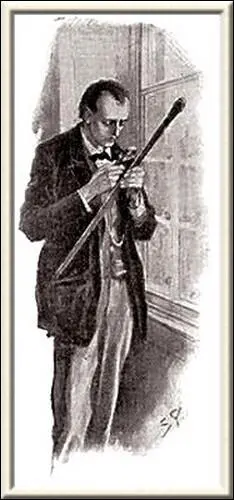
"Interesting, though elementary," said he as he returned to his favourite corner of the settee. "There are certainly one or two indications upon the stick. It gives us the basis for several deductions."
"Has anything escaped me?" I asked with some self-importance. "I trust that there is nothing of consequence which I have overlooked?"
"I am afraid, my dear Watson, that most of your conclusions were erroneous. When I said that you stimulated me I meant, to be frank, that in noting your fallacies I was occasionally guided towards the truth. Not that you are entirely wrong in this instance. The man is certainly a country practitioner. And he walks a good deal."
"Then I was right."
"To that extent."
"But that was all."
"No, no, my dear Watson, not all—by no means all. I would suggest, for example, that a presentation to a doctor is more likely to come from a hospital than from a hunt, and that when the initials 'C.C.' are placed before that hospital the words' Charing Cross' very naturally suggest themselves."
"You may be right."
"The probability lies in that direction. And if we take this as a working hypothesis we have a fresh basis from which to start our construction of this unknown visitor."
Читать дальше





